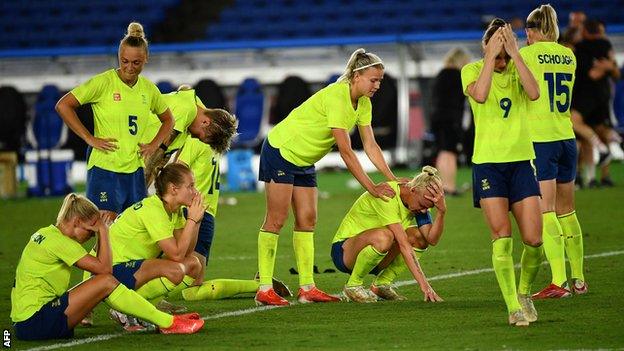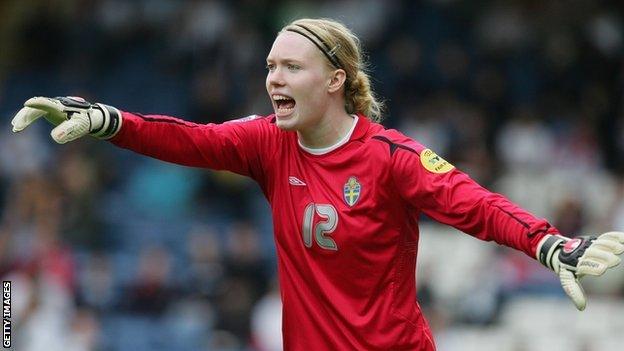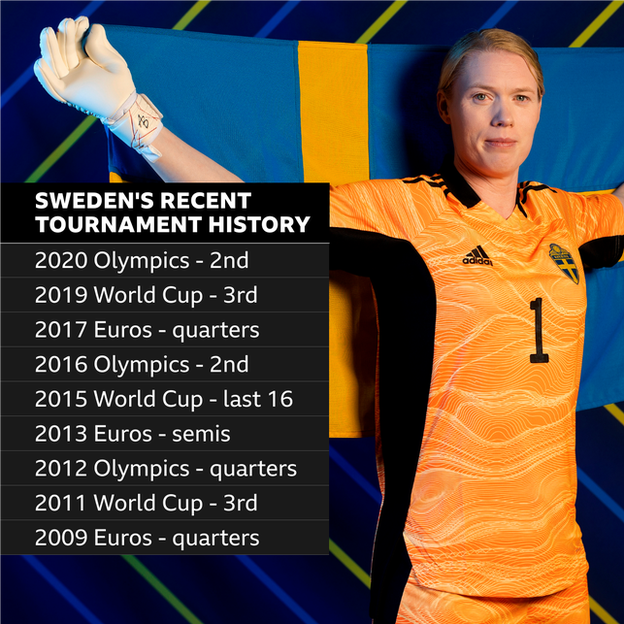Euro 2022: Sweden no longer being held back by law of 'Jante'
- Published

Sweden lost on a penalty shootout to Canada in the Olympic final last summer
Women's Euro 2022 - Netherlands v Sweden |
|---|
Date: Saturday, 9 July Venue: Bramall Lane, Sheffield Kick-off: 20:00 BST |
Coverage: BBC One from 19:20 BST, BBC Radio 5 Live commentary and live text coverage on the BBC Sport website |
Despite being traditionally recognised as one of the world's best teams, Sweden have only ever won one major trophy.
That was back in 1984, in the first ever European tournament to get official Uefa status, when they won a two-legged final against England after triumphing in a penalty shootout.
Somebody well placed to reflect on Sweden's near misses is goalkeeper Hedvig Lindahl, who made her international debut more than 20 years ago.
This summer's Euros is her 15th major tournament. At home she has several silver and bronze medals from World Cups, Euros and Olympics, so why haven't Sweden been able to take that last step?
"Maybe it's the mentality - the Jante mentality," Lindahl, 39, tells BBC Sport.
Jantelagen - the law of Jante - is a well-known Nordic concept and code of conduct about maintaining modesty and not bragging; an ethos of equality and not believing oneself to be better than anyone else.
However, the Atletico Madrid player does not believe Jante will stand in the way of Sweden this summer, instead she thinks the team have found the perfect balance.
"I think every player - from the last to join the team to the ones who have been there the longest - feels the same way, that you are safe to have an opinion.
"What is special about this group is that if you stop an exercise on the training field, you will hear a chatter of different voices. You are safe together and can dare to be unique within the team and, in that way, we get the best out of everyone since everyone contributes with their viewpoint.
"I've played during a few years where I didn't always dare to say what I thought and for me it's important to contribute to an environment where everyone feels that security."
'Daring' is a word that comes to mind about this team - whether it be speaking out about unfairness in the sport, playing more offensive football than Swedish teams are historically known for, or telling the world they are here to win.
Lindahl is one of several players that have made their voices heard.
"It would be very nice if people could just play football and that was it, if there wasn't anything to fight for," she says. "But that's not the case.
"It makes you realise that if I want it to be better for the next generation or for myself while I play, then I have to say something."

Hedvig Lindahl was in goal for Sweden the last time the Euros were held in England in 2005
She has also experienced how the attitude in Sweden towards women's football has changed, particularly since hosting the tournament in 2013.
"In 2003, there were almost four million that watched the World Cup final (Sweden lost 2-1 to Germany) and when we came home there was an incredible celebration. It was like 'wow, finally'… but then you didn't see any bigger effect. Nothing happened until 2013.
"It was almost as if there was a paradigm shift. If you were a women's football fan in Sweden before 2013, it was as if you had to be ashamed of it. People could tweet that it was like cows running on a field; they thought that was a funny joke. But after that summer, if anyone made that joke there would be uproar.
"It became a lot more acceptable to be a fan of women's football."
All the Way (or #HelaVagen)
On the pitch under head coach Peter Gerhardsson, Sweden, who reached the Olympic final last summer, have become a collective force full of individual brilliance.
The way they play is bold - and now they are showing the same attitude off the pitch as well. In April, they launched their new shirt with a campaign named 'How to Stop Sweden'.
"Since we represent a country known for its high level of transparency, we want to up the stakes this summer and keep things ultra transparent by telling our competitors exactly how we play, how we win and how to maybe stand a chance," Sweden match analyst Anders Eriksson could be heard saying in the campaign's advert.
In a comprehensive guide printed on the shirt and available online, Eriksson broke down all of the statistics, tactics and individual data along with giving insights on how to play against Sweden, effectively saying "we are so good, that we can tell you how to beat us, and still you won't be able to".
"It's a bold campaign," Lindahl says. "It goes in line with how we need to think, how we need to dare, in order to be winners."
Stefan Abelsted, who works for the Swedish FA, said: "There are not a lot of national teams that could use this type of campaign but we can take this position because our women's team is that good."
He says the team previously had its own hashtag #HelaVagen, meaning 'all the way', which he says was "about us seeing ourselves as one of the favourites".
"We talked with the team manager, head coach Peter and the team, and asked them 'does this feel good, can we talk like this?' and they wanted that," Abelsted says.
So have Sweden finally found the right squad - and approach - to lift a trophy?
"It feels like we are in a good moment. We want to win and we feel in our entire bodies that we can win," says Lindahl.
